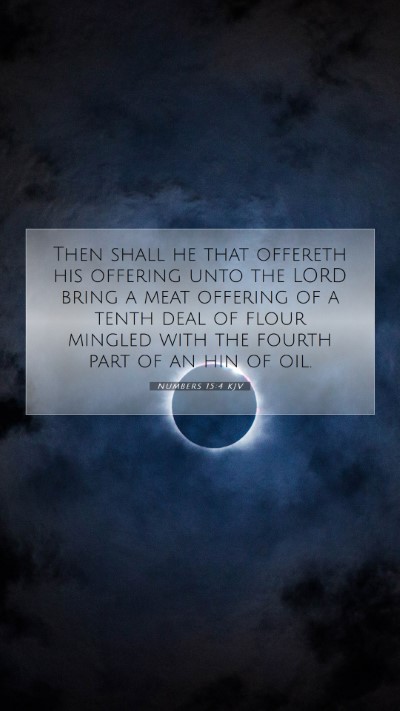Understanding Numbers 15:4
Numbers 15:4 states: "Then shall he that offers his offering unto the LORD bring a meat offering of a tenth deal of flour mingled with the fourth part of a hin of oil." This verse presents instructions concerning the offerings to be made to God, particularly a grain offering with specific proportions of flour and oil.
Biblical Exegesis of Numbers 15:4
This verse falls within a broader context in the Book of Numbers, which provides guidelines for Israelite rituals and worship. The significance of offerings is underscored, highlighting God's desire for His people to approach Him with appropriate sacrifices.
Key Elements in the Verse
- Offering: Represents a gift given to God, acknowledging His greatness and sovereignty.
- Flour and Oil: Common elements in Israelite offerings. Flour symbolizes sustenance and work, while oil is often associated with joy, blessing, and the Holy Spirit.
- Measurement: The specific quantities signify the need for precision and sincerity in offerings, indicating that God expects His people to give thoughtfully.
Bible Verse Meanings from Public Domain Commentaries
Matthew Henry, Albert Barnes, and Adam Clarke offer insights that enrich our understanding of this verse:
Matthew Henry's Commentary
Henry emphasizes that the offerings styled as "meat offerings" refer to grain offerings, which demonstrate the worshipper's thankfulness and consecration to God. He highlights the use of flour and oil, indicating that they were necessary components for a pleasing sacrifice. Henry notes that such offerings were not merely about ritual but about bringing one’s heart and gratitude before the Lord.
Albert Barnes’ Commentary
Barnes points out that the "tenth deal of flour" is a measure that reflects a symbolic act of devotion. He suggests that the combination of flour and oil illustrates the essence of the offering, emphasizing that both substance and preparation matter in approaching God. This correlation reinforces the idea that worship entails quality as much as quantity.
Adam Clarke's Commentary
Clarke elaborates on the cultural significance of the offering, bringing to light how the Israelites viewed sacrifices. He mentions that offerings were acts of homage and praise, aligning one’s resources with faith and trust in God. Clarke also notes that using oil signifies joy and celebration, turning the act of offering into a communal experience of gratitude.
Application and Significance
Understanding Numbers 15:4 allows us to reflect on various aspects relevant to modern-day worship:
- Intentional Giving: The details of offerings remind us that our contributions to God should come from the heart and reflect our relationship with Him.
- Worship and Gratitude: This verse reaffirms that offerings signify more than transactions; they represent love and devotion.
- Community Worship: The shared nature of offerings highlights the communal aspects of faith, encouraging collective expressions of worship.
Bible Study Insights
For those engaging in Bible study groups or exploring online Bible study, this verse serves as a rich discussion point. Leaders can prompt reflections on:
- How should we understand the significance of offerings today?
- What do flour and oil represent in our spiritual lives?
- How can we apply the principles of Numbers 15:4 in our worship practices?
Additional Bible Cross References
This verse connects with several other passages that discuss offerings and worship:
- Leviticus 2:1-16 - Instructions on grain offerings.
- Leviticus 23:17 - Firstfruits and offerings of new grain.
- Hebrews 13:15 - Offering the sacrifice of praise to God.
In-Depth Bible Verse Analysis
This exploration of Numbers 15:4 encourages deeper engagement with Scripture. It helps believers and scholars understand the historical context of Bible verses, learn the meaning of parables in the Bible, and discuss the significance of offerings as part of their Bible study lessons.


